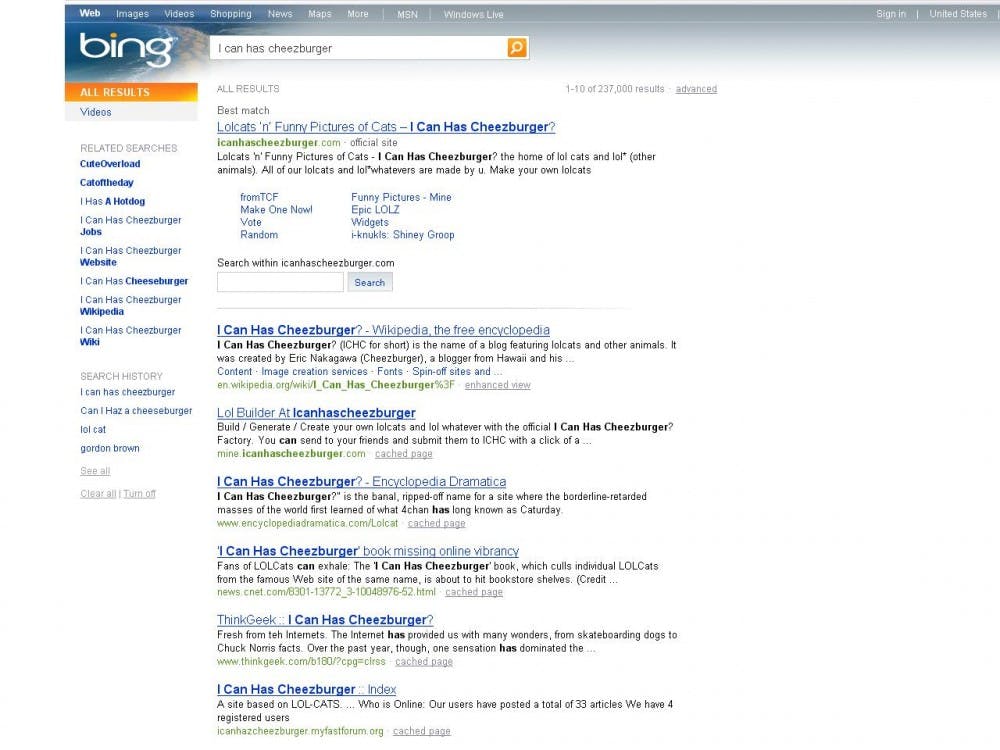The information age is over. If you'd like to attend the wake, please wear black and be courteous to the grieving windows, they've been through a lot. Oh, the Internet will still be around, and there will always be television and newspapers (though at a certain point we'll have to start calling newspapers pamphlets, the news section of USA Today is so light it actually floats up to the ceiling.) But they don't want to inform you, heavens no. That would leave little shades of gray, and allow consumers to try and reach their own conclusions, expand their horizons as only they see fit. The trend now is to be told about events, to be told what to think.
Let's examine Microsoft's add for their new search engine, Bing.
[youtube=http://www.youtube.com/watch?v=0wYrxHrsoXs&feature=player_embedded]
So, if you were paying attention, it's your fault that the economy sucks, because when you should have single-handedly watch dogging the world's economy, you were giggling at Lolcats. And who brought you these Lolcats? Well, search engines, obviously. By giving users the ability to look for whatever they want to, and by providing them a glutton's share of information, those fools at Google are bringing about the end of our lives. Those lovey-dovey gents at Microsoft, however, will shelter you from the Internet, and give you the search results they want.
On the professional front (and this marks the difference between 'professional' actions and the roles of marketers) Bing is intended to merely offer a superior search engine. After all, 42 percent of all searches require refinement, and 25 percent of clicks are on the back button on search sites. But there's a huge gap between presenting a product that's built to be merely superior as a sort of saving grace from what makes the Internet so wonderful, the vast amount of information out there on the web.
I'd love for Microsoft to inform me as to just how Bing is supposed to rise like Christ and solve all of the ignorance about important issues. I typed "I can haz cheezburger," into Bing, searching for the same flotsam that Google has obviously shoved down my throat for years, hoping for Bing's enlightening. Pressing enter, I expected to be re-routed to CNN or the Wall Street Journal, or perhaps be directed toward a governmental website about tariffs and trade policy. Instead, I got...

Alright, so Bing doesn't do what it's ad makes it out to do (imagine that, advertisers lying...) but that's the marketers fault, the problem doesn't lie with the programmers or brainiacs who created Bing. It's a solid search engine that seems to get the job done, and it looks nicer than Google. The problem here lies with the advertisement, which basically says, "Being presented with options for information is dumb. Let us tell you what you should read and watch."
It's cable news on the Internet, in the place of the talking heads, the self-rightous malcontents on both sides of the spectrum, who do their very best to ensure that it's their voice subjugating the news stories they're "reporting" on, Bing steps forth as the search engine that's fair and balanced, ready to present you with the least information on the market.
Why is it, out of every market, lesser quality is seen as an incredible advantage in the information industry? When cars stall and sputter, no one buys them, when peanut butter poisons kids, folks stop spreading it on their sandwiches. But a new search engine seeks to let itself be known as a database that presents you with minimal data? Maybe I'm going about this wrong, and the ad's philosophy is in the right, and that folks shouldn't be presented with as much information as possible so that they can come to their own conclusions.
And maybe my next car should come with three wheels and a dead fish shoved in the exhaust.


